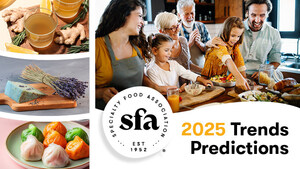NEW YORK, Nov. 19, 2019 /PRNewswire/ -- From "Plants as Plants" to unexpected proteins and everything in between, the Specialty Food Association (SFA) Trendspotter Panel predicts what's coming up for specialty food in 2020.
"As the specialty food industry hits a record year of growth with $148.7 billion in sales, we're seeing that health benefits and sustainability concerns will continue to drive more food and beverage trends in 2020. But, there's also room for fun, whether in the form of canned cocktails or global condiments," said Denise Purcell, head of content for the SFA.
Professionals from diverse segments of the culinary world comprise the SFA'S Trendspotter Panel. Here are the six trends they anticipate for 2020:
- Plants as Plants: Meat Replacement Pushback Across retail and foodservice, plant-based meat alternatives are undeniably popular. Growth will continue, however some Trendspotters predict a consumer return to real fruits and vegetables. Consumers will begin to think critically about meat replacements, looking more closely at the ingredient lists, supply chains, water usage, and food safety, prompting renewed interest in plants as plants, according to the panel.
- Sustainability-Driven Product Development According to SFA's State of the Specialty Food Industry Report 2019-2020, consumers, especially Gen Z, are values-oriented shoppers who look at a company's values and production methods when making purchasing decisions. Upcycled products, those using ingredients that are normally discarded, are becoming more prevalent. Recent products to market have included tea made from discarded avocado leaves, frozen pizzas made with toppings from vegetable scraps, and whey beverages made from a left-over product from cheese-making. Biodynamic farming, a practice that helps sustain the biodiversity and health of the land, is coming more into focus for consumers, and Trendspotter Wendy Robinson, buyer at Market Hall Foods, expects we'll see more products from this practice. "Whether it is motivated by regenerative agriculture, upcycled ingredients, or plant-based foods, products whose values center around sustainability are trending," agrees Trendspotter Reem Assil, chef/owner of Reem's California.
- Fermented Condiments: Gochujang Comes to the Forefront Fermented foods have been trending for a while, and has boosted broad consumer interest in the Korean condiment kimchi. Trendspotters have predicted that the combined expanding interest in fermentation and Korean cuisine will converge to bring the fermented condiment gochujang to the forefront. One of the backbones of Korean cooking, this red chili paste is made with fermented soybeans, seasonings, and glutinous rice and is often used in marinades, dipping sauces, soups, and stews. Expect to see it show up on more foodservice menus and packaged at retail.
- Prebiotic Foods Gain Awareness Prebiotics are types of dietary fiber that feed the friendly bacteria in the gut and are found in foods like bananas, asparagus, seaweed, and barley among others. More of these ingredients will hit the spotlight, with early examples including bars and crunchy snacks made with prebiotic-rich barley and buckwheat. "Probiotic-rich, fermented foods continue to flourish, but expect growing consumer awareness and product development around foods that contain prebiotics," says Melanie Zanoza Bartelme, Trendspotter and global food analyst for Mintel.
- Protein Trend Takes Unexpected Turns: Anchovies and Noodles Consumer awareness of protein is prompting them to seek out interesting sources for their diets, whether under-the-radar varieties or new innovations. Anchovies are poised to take off, according to the panel, gaining ground as a sustainably caught, flavor-packed option, most notably on restaurant menus topping burgers or being used as an ingredient in butters, marinades, and even cookies. The trend could also bode well for other small jarred or tinned fish like herring or sardines. Protein-packed noodles also are on the rise but are moving beyond the lentil- and legume-based varieties that have been on the market. Trendspotters anticipate seeing more noodles made from seafood, or nutrient-packed noodles containing minerals and dietary fiber.
- Convenient Cocktails and Mocktails The Trendspotter panel named Raising the Cocktail Game one of the top trends of the 2019 Summer Fancy Food Show thanks to a slew of new mixers, tonics, and garnishes to help consumers make bar-quality cocktails at home. "Look for a continuation in 2020 with the trend expanding with more cocktails in cans and bottled mocktails that offer sophisticated alternatives for non-drinkers or curious consumers," says Trendspotter Andrew Freeman, founder of af&co. And in a related trend, canned beverages spiked with CBD are also expected to emerge.
STILL TRENDING
CBD Trendspotters see continuing growth in products across categories containing CBD, especially as the market gains a greater understanding of the incorporation of it and other functionals as ingredients.
Dairy-free products Dairy alternatives, oat and nut-based milks in particular will continue to reign in yogurts, beverages, creamers and frozen desserts.
Fermented beverages Refrigerated, ready-to-drink functional beverages have grown 55 percent in retail sales, according to SFA's State of the Specialty Food Industry research. Probiotic-friendly kombucha has led the charge, and more fermented functional beverages touting health, tradition, and flavor are on the horizon. Drinking vinegars, which are high in probiotics, amino acids, and antioxidants, will also continue to emerge.
Regional cuisines of Asia, West Africa, and Latin America This top trend of 2019 will continue in the new year as consumer knowledge grows. Look for flavors and ingredients from these areas in spices, sauces, and bases.
The Specialty Food Association Trendspotter Panel
- Polly Adema, PhD, director and associate professor, Master of Arts in Food Studies, University of the Pacific San Francisco Campus, San Francisco, CA
- Reem Assil, chef/owner, Reem's California, Oakland, CA
- Melanie Zanoza Bartelme, global food analyst, Mintel, Chicago, IL
- Jonathan Deutsch, PhD, professor, culinary arts and food science, founder and director of The Drexel Food Lab, Drexel University, Philadelphia, PA
- Andrew Freeman, founder, af&co., San Francisco, CA
- Tonya Hopkins, founder, The Food Griot, Brooklyn, NY
- Lawrence Jacobs, buyer, Oliver's Markets, Santa Rosa, CA
- Vallery Lomas, founder, Foodie in New York, NY, NY
- Kara Nielsen, trendologist, Emeryville, CA
- Melina Romero, manager, Trend Practice, CCD Helmsman, Emeryville, CA
- Tu David Phu, chef, Oakland, CA
- Victoria Jordan, director of partnerships, James Beard Foundation, NY, NY
About the Specialty Food Association
Founded in 1952 in New York City, the Specialty Food Association (SFA) is the leading advocate for the $148.7 billion specialty food industry. Representing makers, importers, entrepreneurs, retailers, distributors and others in the trade, the SFA aims to champion, nurture and connect its members to deliver traditional and innovative new products to consumers that expand consumption of specialty foods. With over 3,800 member companies, the Association helps its members through providing information, research, educational events, and celebrating the industry through its awards programs. The SFA is known for hosting the Winter and Summer Fancy Food Shows, and presents the sofi™ Awards honoring excellence in specialty food. Learn more at specialtyfood.com.
Facebook: Specialty Food Association
Twitter: @Specialty_Food
LinkedIn: Specialty Food Association
Pinterest: @specialtyfoodassociation
Instagram: @specialtyfoodassociation
SOURCE Specialty Food Association

Related Links
WANT YOUR COMPANY'S NEWS FEATURED ON PRNEWSWIRE.COM?
Newsrooms &
Influencers
Digital Media
Outlets
Journalists
Opted In




Share this article